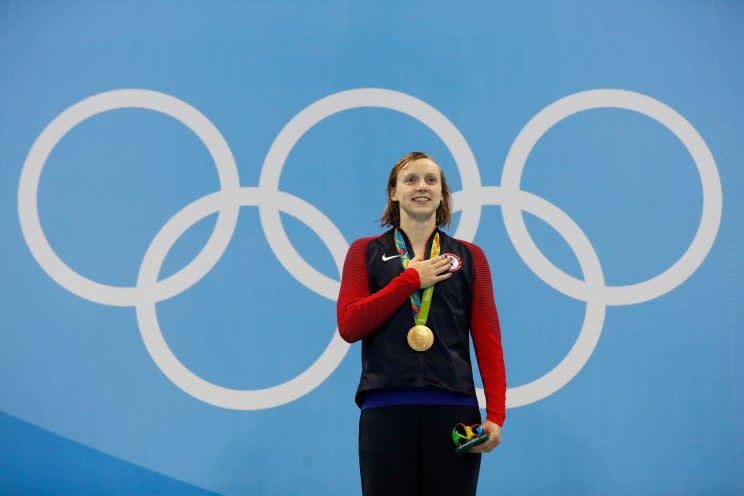Latest gold shows Katie Ledecky is on her way to owning American swimming


Iron Lady wins in an upset | King wins battle of USA vs. Russia | Murphy sets Olympic record
RIO DE JANEIRO – There was Katie Ledecky, still a teenager, still bright-eyed and bushy-tailed, immune to the rigors of high-level swimming, impervious to everything around her. Which, to be honest, was nothing. Just her, 660,000 gallons of water and history.
Much like the night before, an Olympic swimming race had turned into a one-woman showcase. Redemption drove Katinka Hosszu, the star of Saturday night. For Ledecky, it was the opposite – not chasing the past but foretelling the future, one in which the United States looks upon her as the finest female swimmer it ever produced. Nights like Sunday, races like the 400-meter freestyle, make goal look more like prophesy.
Ledecky dusted the best the world had to offer and by the time she touched the final wall she had shattered her own world record by nearly two seconds. Her final time of 3:56.46, almost five seconds ahead of silver medalist Jazz Carlin and close to 5½ seconds on the bronze medalist, Ledecky’s U.S. teammate Leah Smith, glistened on the scoreboard, with WR – world record – next to it in capital letters.
That Ledecky would beat her own mark, set nearly two years earlier in Australia, felt like a foregone conclusion coming into the race. That she would win her second Olympic gold by a margin similar to Hosszu the night before – and do it on the night Michael Phelps, the standard bearer of the sport, captured his 19th – made it that much better.
“The goal I set after worlds in 2013 was 3:56 or better,” Ledecky said. “And just to see the 56 up there feels really good.”
Four hundred-meter swimming races at the Olympic level with margins of victory nearing a quarter lap are practically unheard of – and the first two nights of the Rio Games gifted the world two such blowouts. They were similarly astounding – Hosszu’s mastery of all four strokes in the 4×100-meter individual medley and Ledecky’s blitzkrieg proving that her Olympic showing as a 15-year-old in the 800-meter freestyle foretold so much more to come.

Ledecky’s precociousness has saved her from the controversy that stalks Hosszu, including a libel lawsuit against a swimming magazine. Hosszu placed 31st in her lone race as a 15-year-old at the Olympics. Ledecky won a gold medal in her lone race as a 15-year-old at the Olympics. Hosszu was 12th and 17th in her two races as a 19-year-old at the Olympics. Hosszu didn’t medal as a 23-year-old, either. By the time she’s 23 at the Tokyo Games in 2020, Ledecky could have five golds already.
One later this week in the 800 free is a gimme. The United States is favored in the 4×200-meter freestyle relay, which Ledecky will anchor. And her fifth medal of Rio – she won a silver in the 4×100 free relay – could come in the 200-meter freestyle, in which she’ll face off against Swedish sprinter Sarah Sjostrom, who won the 100-meter butterfly gold Sunday night.
“The last five years,” Sjostrom said, “there has been so much progress. … Someone will always swim faster and break the world record because swimming is still going to improve a lot.”
Just as Phelps’ dominance forced other men to take a similar leap forward, Ledecky could be doing the same for women. It was one thing to see her so far ahead of the other women in the race. (Calling them competitors would be a misnomer.) It was another for Ledecky to turn on the turbo boosters over the final 50 meters and swim the split in 28.92 seconds, the fastest of anyone in the race by nearly half a second.
[Related photos: Michael Phelps with each of his Olympic medals]
“Part of you is in awe,” Smith said, “and part of you is trying to catch up to her.”
The awe part is about 99 percent, because the chances of anyone catching Ledecky were infinitesimal. Over the last month, as Smith trained with Ledecky, she said: “The times that she put up in practice make me look like I’m going to go, like, five minutes.” No other woman had cracked the 4-minute mark without the assistance of a performance-enhancing swimsuit, and Ledecky’s previous world record of 3:58.37 came when she was in high school. Ledecky is off to Stanford this fall, far more mature, records but constructs for her to shatter.
“This is just the beginning,” Smith said. “She has a lot more in her career.”
And that’s what’s scary. Swimming can be a brutal sport. The time and commitment are staggering, the burnout rate palpable. Primes can be short, which is why as easy as it is to look at 2020 or 2024 or beyond, guaranteeing anything for Ledecky is foolhardy.
Still, it’s tempting. Ledecky was winning high-level races before puberty, and her ability to weather the vagaries of the sport are indeed impressive. On Sunday, she stared down an event she was supposed to win and did so in extraordinary fashion. In the race with the yellow line of her past, she kicked it into the dustbin.
When Ledecky saw the 56, she said, she felt nothing but “pure happiness.” The feeling accompanied her all the way to the medal stand, where Ledecky stepped atop the podium and placed her hand over heart for the “Star-Spangled Banner,” red hair vaguely similar in color to the ore hanging from her neck. She stood alone. Just her, a gold medal and history.


